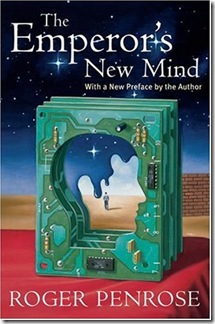The Emperor's New Mind by Roger Penrose may be the best book about modern science yet written. The range of issues addressed by Penrose is vast, from Relativity and quantum mechanics, to many questions about mathematics, and ultimately to important questions about Artificial Intelligence; and Penrose's authority as one of the greatest living mathematicians to address these things is unique. Penrose's thesis, therefore, that Artificial Intelligence through computers, as presently constructed, cannot in principle duplicate the workings of the human brain, and his argument that Einstein was not wrong to express grave philosophical doubts about quantum mechanics, are given a weight that they would not have if merely some philosopher, or anyone else less intimately involved with the mathematical and theoretical underpinnings of physics, had expressed similar views.
The Emperor's "new clothes," of course, were no clothes. The Emperor's "New Mind," we then suspect, is nothing of the sort as well. That computers as presently constructed cannot possibly duplicate the workings of the brain is argued by Penrose in these terms: that all digital computers now operate according to algorithms rules which the computer follows step by step. However, there are plenty of things in mathematics that cannot be calculated algorithmically. We can discover them and know them to be true, but clearly we are using some devices of calculation ("insight") that are not algorithmic and that are so far not well understood -- certainly not well enough understood to have computers do them instead. This simple argument is devastating.
Along the way, Penrose has an interesting take on Gödel's Proof of the incompleteness of mathematics. He notes (pp. 105-108) that if David Hilbert were right and all of mathematics could be completely reduced to a formal syntactic system, then mathematics need have no meaning -- "true" and "false" would simply mean "derivable" and "non-derivable" in the formalism of the system. Hilbert himself recognized this and had said that mathematical terms could mean "beer steins, sausages, and tables" instead of what they are interpreted to mean mathematically (obviously, Hilbert spent some time in German beer gardens). Instead, Gödel demonstrated that in any formal syntactic system there will be propositions that are true but not through formal derivation from the axioms of the system. Thus, Penrose notes, they are true because of their meaning, not because of their syntax relation to an axiomatic system. This reinforces the thesis of Jerrold Katz, that syntactic simples are not semantic simples, and so some truths will depend on semantic contents that cannot be exhaustively expressed as syntax. (click for full review)
http://rapidshare.com/files/118968233/kitap25.rar (5173 KB, şifre: 25kitap46368)




No comments:
Post a Comment